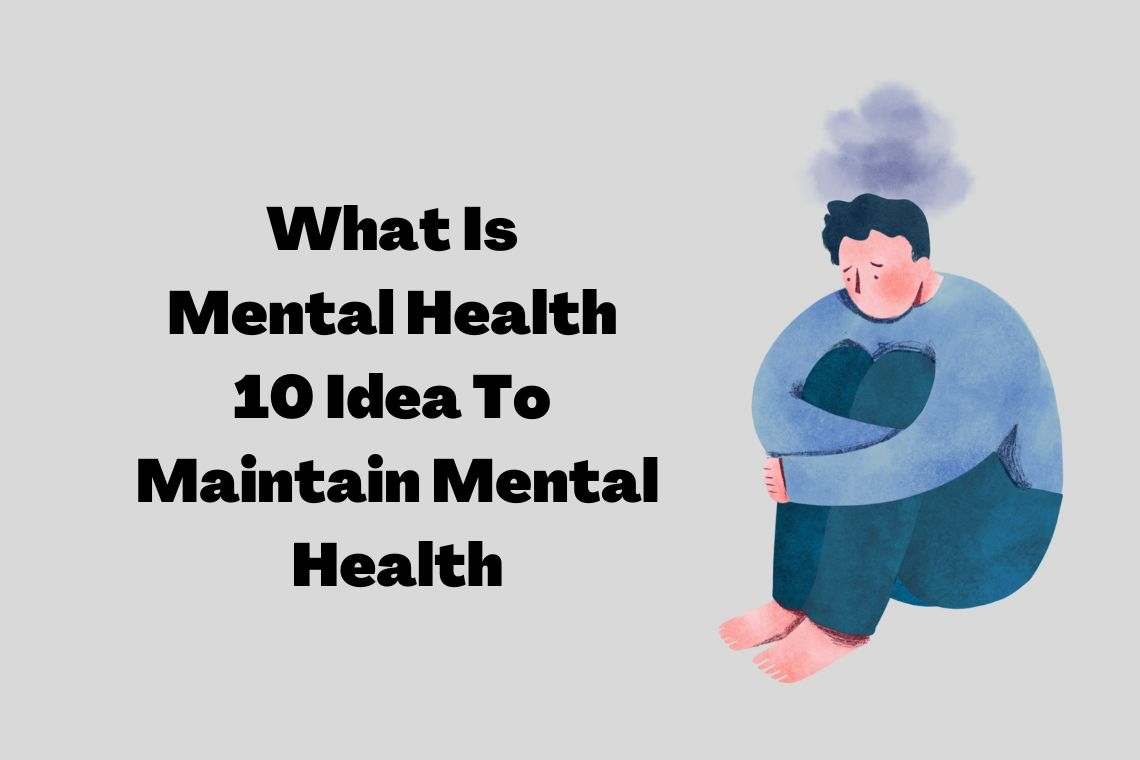
In today’s fast-paced and demanding world, mental health has gained significant recognition as an essential aspect of overall well-being. It encompasses our emotional, psychological, and social well-being, affecting how we think, feel, and act.
Table of Contents
What Is Mental Health? 10 Way To Maintain It
Understanding Mental Health: A Guide to Maintenance and Well-being
Introduction:
Mental health is not merely the absence of mental illness but rather a state of flourishing where individuals can cope with life’s challenges, form meaningful relationships, and contribute to society. This article aims to provide a comprehensive understanding of mental health and offer practical tips for maintaining optimal well-being.
Defining Mental Health:
Mental health refers to a person’s cognitive and emotional well-being. It involves the ability to manage stress, make sound decisions, cope with adversity, and maintain fulfilling relationships. It is influenced by various factors, including genetics, life experiences, and environmental circumstances.
Maintaining Mental Health:
1. Self-Care and Well-Being Practices:
- Prioritize self-care: Engage in activities that bring joy and relaxation, such as hobbies, exercise, or spending time in nature.
- Practice mindfulness: cultivate present-moment awareness, reduce stress, and increase overall well-being.
- Get sufficient sleep: Prioritize a consistent sleep schedule to support cognitive function and emotional stability.
- Maintain a balanced diet, Nourish your body with wholesome foods that support brain health and provide essential nutrients.
2. Building Resilience:
- Develop a support network: Surround yourself with positive and understanding individuals who provide emotional support.
- Set realistic goals, Break larger goals into smaller, achievable ones, celebrating each milestone along the way.
- Embrace change, Adaptability and flexibility are crucial in navigating life’s challenges. Focus on finding solutions and learning from setbacks.
- Practice positive self-talk: challenge negative thoughts and replace them with positive and empowering statements.
3. Seeking Help:
- Remove stigma: Understand that seeking help for mental health is a sign of strength, not weakness.
- Professional support: Reach out to mental health professionals, such as therapists or counselors, who can provide guidance and therapy.
- Support groups: Join local or online communities where individuals with similar experiences can share insights and provide support.
- Stay informed: Stay updated on mental health resources, workshops, and educational materials that can aid in understanding and managing mental health.
4. Creating Work-Life Balance:
- Establish boundaries: Set clear limits between work and personal life, ensuring time for relaxation, hobbies, and quality time with loved ones.
- Take breaks: Regularly step away from work-related tasks to recharge and rejuvenate your mind.
- Time management: prioritize tasks, delegate when possible, and practice effective time management techniques to reduce stress.
5. Embracing Emotional Intelligence:
- Understand and express emotions: recognize and acknowledge your feelings, allowing yourself to experience them without judgment.
- Develop healthy coping mechanisms: Find constructive ways to manage stress and process emotions, such as journaling, art, or engaging in physical activity.
- Practice empathy: cultivate understanding and compassion towards others, promoting positive connections and healthier relationships.
6. Cultivating Positive Relationships:
- Nurture meaningful connections: Surround yourself with supportive, uplifting individuals who contribute positively to your life.
- Communicate openly: Foster honest and open communication in your relationships, expressing your thoughts and feelings while actively listening to others.
- Set boundaries: Establish healthy boundaries to ensure your emotional well-being and protect yourself from toxic or draining relationships.
7. Managing Stress:
- Identify stress triggers: Recognize the factors that contribute to stress in your life, whether they are work-related, personal, or environmental.
- Practice stress management techniques: Explore stress-reducing activities such as deep breathing exercises, meditation, yoga, or engaging in hobbies that promote relaxation.
- Time for relaxation: Incorporate regular periods of relaxation into your routine, allowing yourself to recharge and unwind.
8. Engaging in Meaningful Activities:
- Find purpose: Engage in activities that bring a sense of fulfillment and purpose to your life, such as volunteering, pursuing hobbies, or setting personal goals.
- Engage in creative outlets: Explore your creativity through activities like writing, painting, playing an instrument, or any other form of artistic expression that brings you joy.
- Practice gratitude: Cultivate a gratitude mindset by regularly acknowledging and appreciating the positive aspects of your life.
9. Limiting Exposure to Negative Influences:
- Digital detox: Take breaks from excessive screen time and social media to reduce exposure to negative or triggering content.
- Choose healthy media consumption: Select media that promotes positive messages, inspiring stories, and educational content.
- Surroundings matter: Create an environment that promotes relaxation and positivity, whether it’s through decluttering, decorating with calming colors, or incorporating natural elements.
10. Stay Connected with Yourself:
- Practice self-reflection: Set aside time for self-reflection to gain insight into your thoughts, emotions, and personal growth.
- Listen to your needs: Pay attention to your physical and emotional needs, honoring them and taking action to address them.
- Be kind to yourself: Practice self-compassion and self-acceptance, embracing your imperfections and celebrating your achievements.
Remember, maintaining mental health is an ongoing process, and it’s crucial to adapt these strategies to your unique circumstances. Seek support from mental health professionals or trusted individuals if you face challenges along the way. By prioritizing mental health, you can lead a more fulfilling, balanced, and resilient life.
Conclusion:
Mental health is a vital aspect of overall well-being and deserves attention and care. By implementing self-care practices, building resilience, seeking help when needed, and creating a healthy work-life balance, individuals can proactively maintain and improve their mental health. Remember, mental health is an ongoing journey, and it’s essential to be patient and kind to oneself throughout the process. Let us collectively work towards creating a society that prioritizes mental health and fosters a supportive environment for everyone.







I’m enjoying reading all the great information on your website, and I hope that you keep making such great work. Success should always be with you.
I’m often to blogging and i really appreciate your content. The article has actually peaks my interest. I’m going to bookmark your web site and maintain checking for brand spanking new information.
Your blog is a true reflection of your expertise in the field.